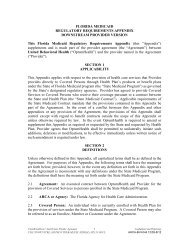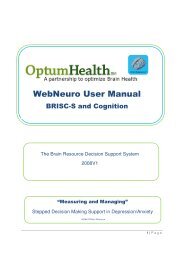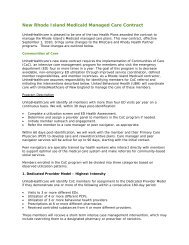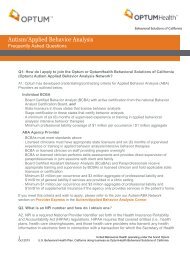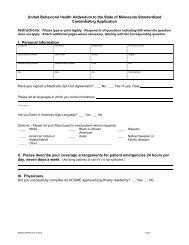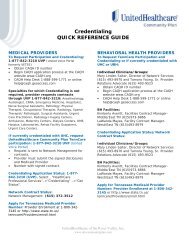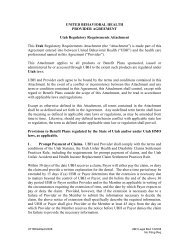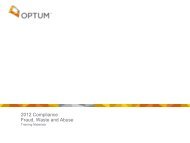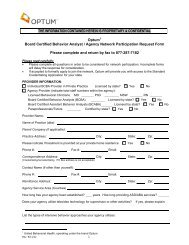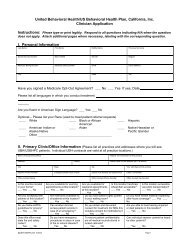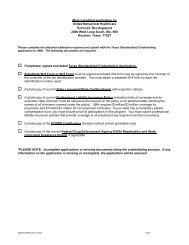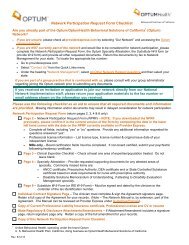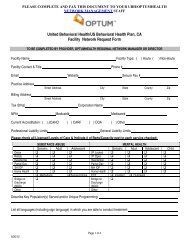Oppositional Defiant Disorder, Intensive Outpatient ... - Ubhonline.com
Oppositional Defiant Disorder, Intensive Outpatient ... - Ubhonline.com
Oppositional Defiant Disorder, Intensive Outpatient ... - Ubhonline.com
Create successful ePaper yourself
Turn your PDF publications into a flip-book with our unique Google optimized e-Paper software.
INDICATIONS FOR COVERAGE<br />
<br />
<br />
<br />
<br />
<br />
Key Points<br />
According to the DSM, the onset of <strong>Oppositional</strong> <strong>Defiant</strong> <strong>Disorder</strong> (ODD) typically occurs by<br />
age 8 and includes a pattern of negativistic, hostile, and defiant behavior lasting at least 6<br />
months, during which there is a presence of four or more of the following (Diagnostic and<br />
Statistical Manual of Mental <strong>Disorder</strong>s, Fourth Edition (DSM-IV-TR), 2000):<br />
o<br />
o<br />
o<br />
o<br />
o<br />
o<br />
o<br />
o<br />
Frequent loss of temper<br />
Frequent arguments with adults<br />
Often defies or refuses to <strong>com</strong>ply with adults’ requests or rules<br />
Often deliberately annoys people<br />
Often blames others for his or her mistakes or misbehavior<br />
Often touchy or easily annoyed by others<br />
Often angry and resentful<br />
Often spiteful or vindictive<br />
Establishing a definitive diagnosis requires that the related disturbance (DSM-IV-TR):<br />
o<br />
o<br />
o<br />
o<br />
Is more frequent than observed in individuals of <strong>com</strong>parable age and developmental<br />
level;<br />
Causes significant impairment in social, academic, or occupational functioning;<br />
Does not occur during the course of a Psychotic or Mood <strong>Disorder</strong>; and<br />
Does not meet the criteria for Conduct <strong>Disorder</strong> or Antisocial Personality <strong>Disorder</strong>.<br />
Differential diagnosis to rule out disorders that mask or mimic ODD in addition to the<br />
identification of <strong>com</strong>mon co-occurring conditions that may <strong>com</strong>plicate treatment such as<br />
ADHD, Substance Use <strong>Disorder</strong>s, Mood <strong>Disorder</strong>s, Anxiety <strong>Disorder</strong>s, Adjustment <strong>Disorder</strong>s<br />
and learning and developmental disabilities should be <strong>com</strong>pleted. Specifically consider<br />
whether the patient is exhibiting normal behavior according to age and stage of development<br />
(American Academy of Child and Adolescent Psychiatry (AACAP), 2007).<br />
Optum maintains that the treatment of ODD should be consistent with nationally recognized<br />
scientific evidence as available, and prevailing medical standards and clinical guidelines.<br />
Comprehensive treatment for ODD is typically treated in an outpatient setting. Members with<br />
ODD should be treated in a level of care that is least restrictive and most likely to prove safe<br />
and effective (Optum Level of Care Guidelines (LOCGs), 2012). Choice of intensive<br />
outpatient treatment is indicated for members with at least one of the following:<br />
o<br />
o<br />
o<br />
Moderate symptoms of ODD that cannot be managed in a less intensive level of<br />
care and/or a higher level of care may be required if IOP is not provided<br />
(Association for Ambulatory Mental Healthcare (AABH), 2008);<br />
Moderate impairment in the member’s psychological, social, occupational,<br />
educational, or other area of functioning has impacted the member’s ability to<br />
perform regular daily activities as <strong>com</strong>pared to baseline (AABH, 2008);<br />
The member has <strong>com</strong>pleted treatment at a higher level of care and continues to<br />
require the monitoring provided in an IOP setting (AABH, 2008).<br />
<strong>Intensive</strong> <strong>Outpatient</strong> Treatment of <strong>Oppositional</strong> <strong>Defiant</strong> <strong>Disorder</strong> (ODD) Page 2 of 14<br />
Coverage Determination Guideline<br />
Confidential and Proprietary, © Optum 2012<br />
Optum is a brand used by United Behavioral Health and its affiliates



